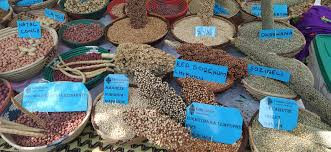
HORTICULTURE farmers under the ZimTrade-developed peas cluster in the Midlands province have been encouraged to adopt widely recognised standards to compete on the international market.
The cluster is in the production of mangetout and sugar snap peas for the European market.
ZimTrade earlier this month organised a Global GAP awareness seminar in the Midlands province to conscientise farmers on the importance of meeting international standards.
The seminar exposed the farmers to a wide range of issues that will improve the competitiveness of their products on international markets.
“At the seminar, the farmers learned the importance of adhering to standards and attaining necessary certifications as these will unlock access to lucrative markets,” the organisation said in a report.
“Standards and certifications are a key component of export competitiveness and without them farmers have limited or no access to the lucrative global markets.
“Farmers operating under the Midlands peas cluster were encouraged to follow and adopt specific standards that are widely recognised, which makes it easy for their produce to compete on international markets.”
The seminar exposed members of the cluster to the Global GAP, a voluntary standard that was established following increasing food safety concerns by supermarkets and retailers in the late 90s.
- Zimbabwe’s trade deficit narrows to US$179m
- Zimbabwe’s trade deficit narrows to US$179m
- Malawi warms up to Zim products
- ZimTrade targets African markets
Keep Reading
“Participants were given a run through of the benefits of obtaining the standard, such as that it reduces farmers exposure to food safety and product safety reputation risks,” said ZimTrade.
The standard brings greater efficiency in production, leading to improved business performance and efficiency of farm processes and management. The standard also minimises wastage of vital resources and requires a general approach to farming that builds best practices for generations to come.
“The importance of good record keeping was emphasised, and a brief overview of topics covered in Global GAP was given. These included complaints handling, product recall/withdrawal procedure handling of non-conforming products, among a host of others,” the ZimTrade report further read.
During training, participants also learnt that Global GAP adds value to products, and enables farmers to gain access to new local and global customers, markets, suppliers and retailers.
The participants were also advised on the need to create stronger linkages with key stakeholders who include buyers, logistics companies and financiers.
ZimTrade said the attendance by other strategic partners at the seminar, who made presentations on other subjects of interest to the cluster, added weight to activities.
For example, NMB, a commercial bank, presented financing options that the cluster could consider exploiting to access the much-required financing.
Most farmers fail to meet horticulture export orders due to lack of funding for equipment, labour, inputs and the general production of the crops.
Logistics company, BAK Logistics, also gave the farmers an appreciation of how logistics for fresh produce was handled by the company.
Considering that Zimbabwe is a land-linked country, seaports in Mozambique, South Africa and Namibia are usually used by exporters with bulk produce that takes long to perish, while the fast-to-perish produce uses air freight.
The Export Credit Guarantee Company of Zimbabwe also attended the event and gave farmers insights into how farmers can minimise risks in export business, the report notes.
Some of the common losses may arise from a variety of commercial and political risks inherent in all export transactions.
“By having insurance, the Midlands peas cluster could enhance their capacity to compete in the international markets and enable them to break into new markets, introduce new products and take up new buyers,” the ZimTrade report said.
A representative of Agritex also spoke on the agronomic issues around the production of an export grade pea crop and emphasised the need to use approved chemicals as per Global GAP guidelines.
A representative of Lingfield Farm — a current exporter to Europe — gave the participants information on how to handle the harvest to ensure produce is kept at its best until it reaches its destination.
- Follow us on Twitter @NewsDayZimbabwe











